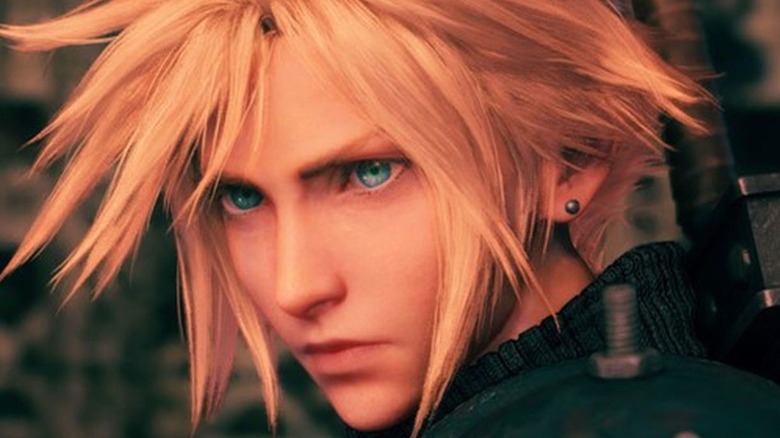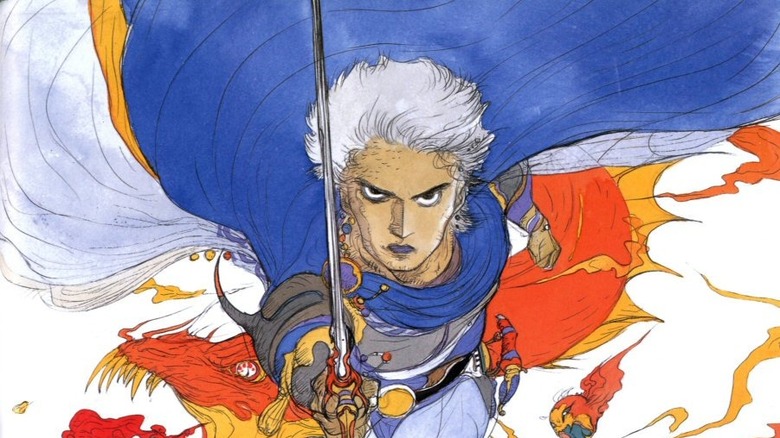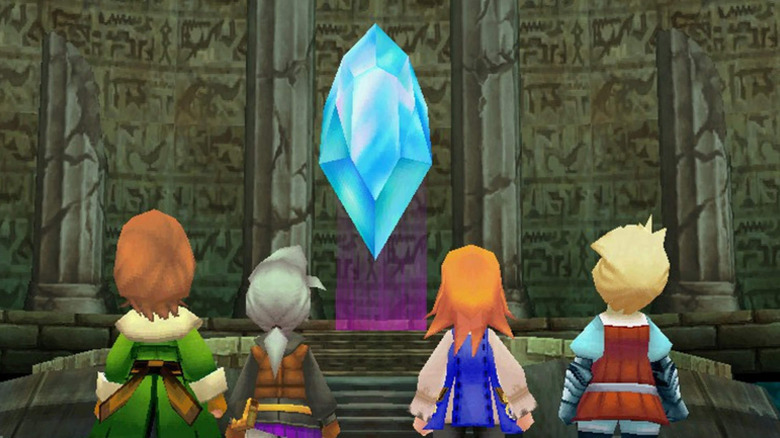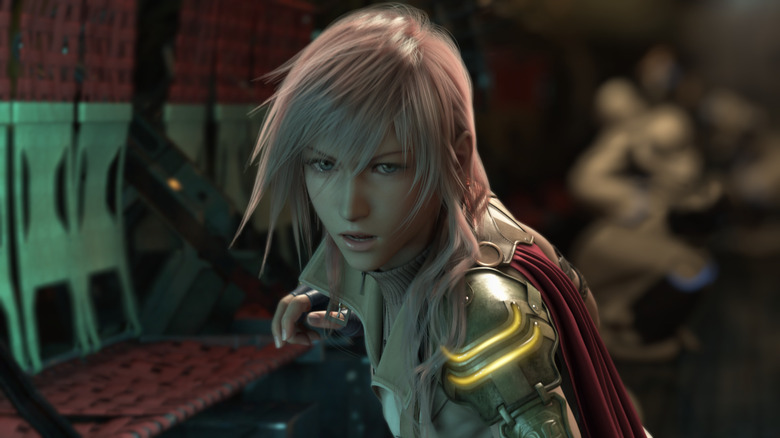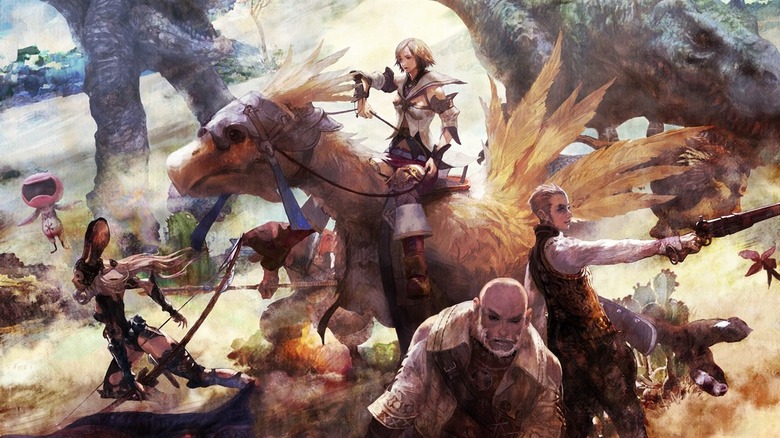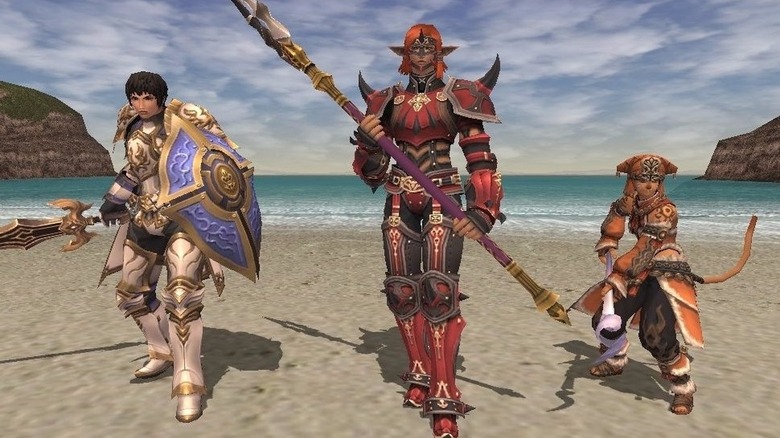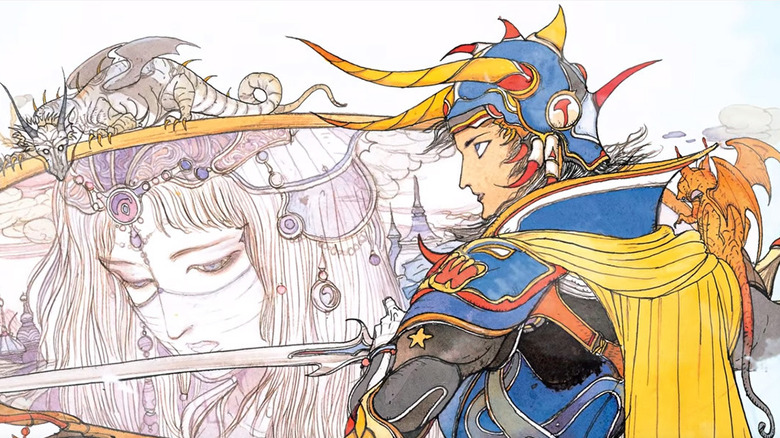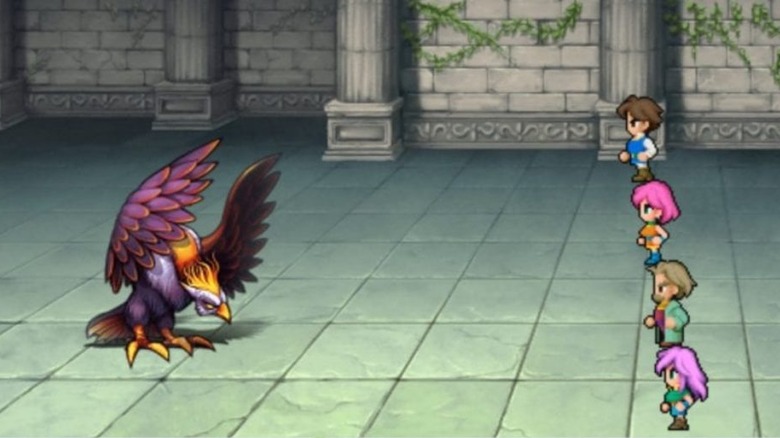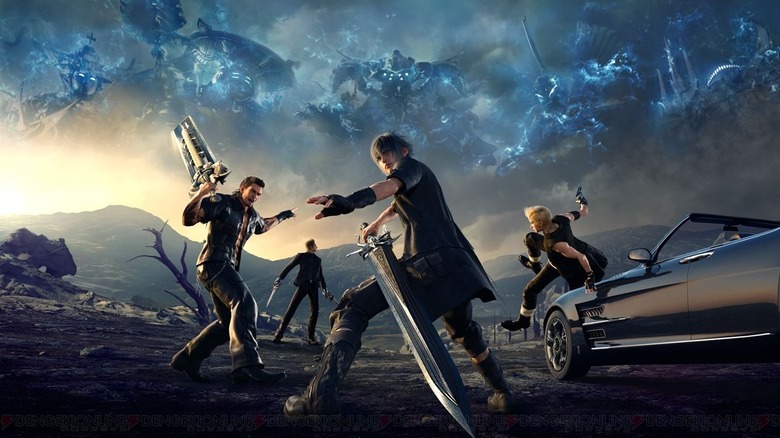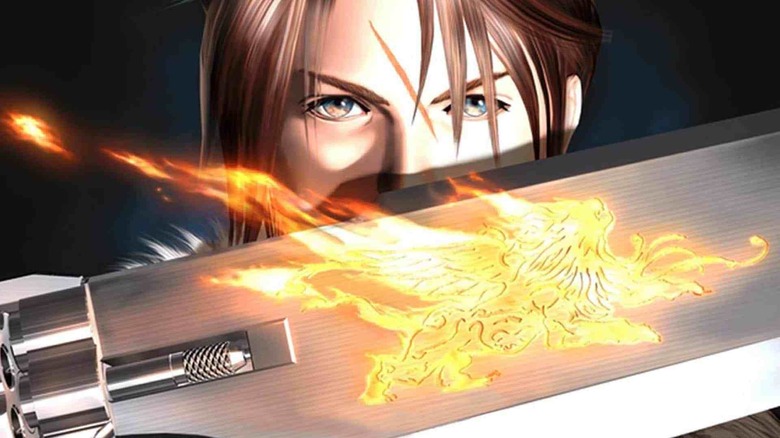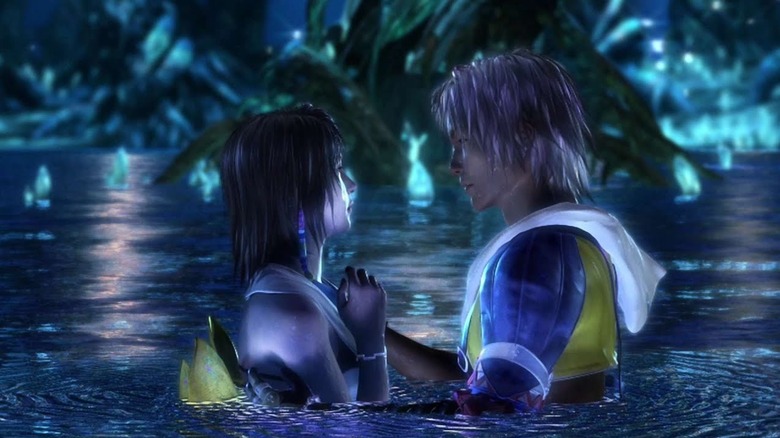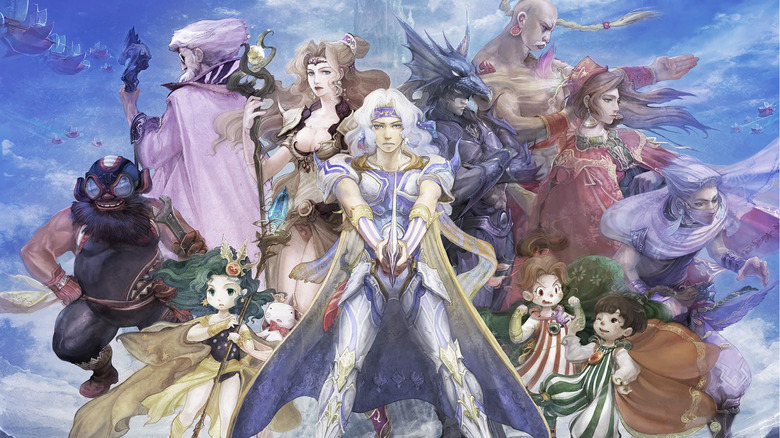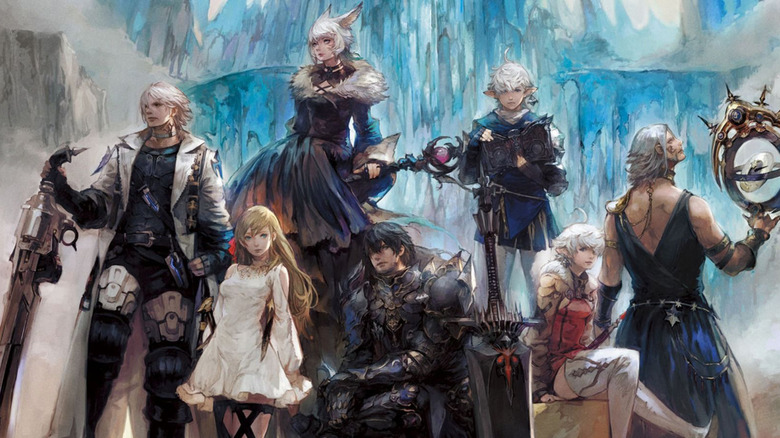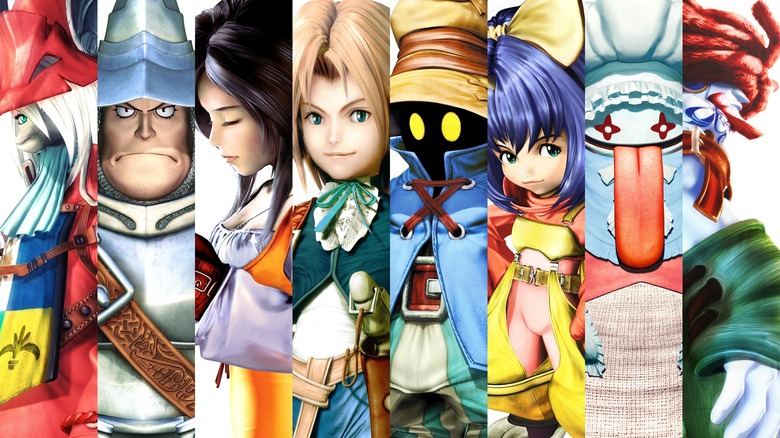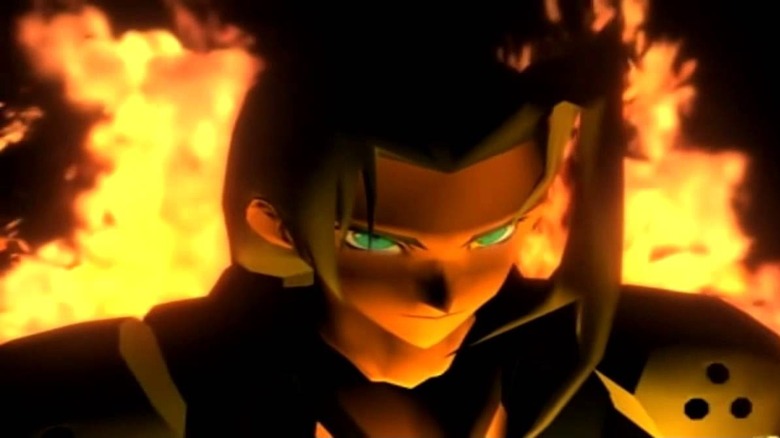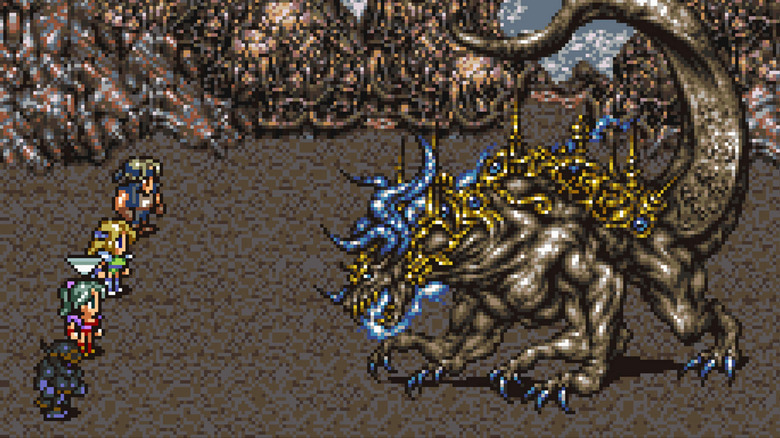Every Mainline Final Fantasy Game Ranked
The most famous JRPG franchise in the world, "Final Fantasy" is one of video gaming's greatest dynasties, and an important force in the fantasy genre as a whole. Throughout it's long tenure, it has introduced a pantheon of iconic heroes and heroines, all of whom have passionate fans all over the world. Despite being a long-lived franchise, its legacy is one of radical reinvention, with each new installment featuring a new world, an original cast of characters, and unique mechanical systems that shape both storytelling and gameplay.
Due to the unique appeal of each of these worlds, it must be acknowledged that ranking the "Final Fantasy" entries is a highly subjective endeavor. Many of these entries have received remakes, direct sequels, and supplementary materials expanding on their worlds, but the core 15 "Final Fantasy" titles released to date should be compared based on their individual merits, as well as their impact on the industry and genre. Putting nostalgia aside can be difficult, but certain entries in the franchise clearly stand head and shoulder over the others. Be warned, as franchise spoilers abound.
Final Fantasy 2
An obscure release outside of Japan, there is a strong case to be made for "Final Fantasy 2" being the weakest link in the series. Writing for Kotaku, Jason Schreier referred to the game as the "black sheep" of the series, for a variety of reasons. The game's unusual character building system does not feature experience points or traditional levels. Instead, stat gains are largely determined by player actions and heavy degrees of random number generation. Bizarrely, this results in a system where attacking your own party members might be one of the most efficient forms of grinding to maximize stat gains.
The story, while solid for its time, is largely unmemorable when compared to many of the franchise's later outings, despite its relentless grimness. The game chronicles the advance of the ruthless Paramecia Empire, an aspiring hegemony willing to use monsters, poison, and brute force to subjugate other nations. The four main characters — Firion, Gus, Maria, and Leon — are a fairly forgettable quartet (though still more distinctive than the Onion Knights from the following game).
Despite these shortcomings, "Final Fantasy 2" still has its redeeming qualities. It was the first title in the series to introduce series mainstays, like the recurring character named Cid and the lovable Chocobo mounts. Above all, the game established the tradition of reinvention and risk-taking that appears in every game in the series.
Final Fantasy 3
Like its direct predecessor, "Final Fantasy 3" initially went unreleased outside of Japan. While the title's use of character levels and experience points was a welcome return to form, a great deal of the game feels like a retread of ideas that had already become familiar. The game's greatest contribution to the "Final Fantasy" formula was the introduction of the Job System, which gave everyone a part to play in the conflict and allowed players the opportunity to learn new commands in battle beyond attacking, casting spells, and using items.
Narratively, the story of the Onion Knights is often overshadowed by the superior "Final Fantasy 4," which was originally released as "Final Fantasy 2" in the US. It is worth noting that the 3D remake of the game added material to distinguish the members of the adventuring party from each other, and overall provides a more palatable experience for modern players. Even so, IGN called the DS release of the game "surprisingly monotonous," and the core narrative of four Warriors of Light charged with restoring balance and order feels fairly cliché.
Final Fantasy 13
As noted by Otaquest, "Final Fantasy 13" and its direct sequels are particularly "polarizing" titles among franchise fans. One source of controversy was the cast of characters. While some of the game's heroes, like Lightning and Sazh, were well-liked, Hope, Snow, and Serah are some of the most poorly-received characters in the annals of "Final Fantasy."
Many fans also took issue with the game's dense battle mechanics. The Paradigm Shift battle system required players to rotate between a number of party roles, limiting their available commands at any given moment. The designers' intent was to create a more action-forward fighting system, and despite its controversies, the influence of "FF13" is evident in subsequent titles, particularly in "Final Fantasy 15" and "Final Fantasy 7 Remake."
Another handicap is that "Final Fantasy 13" by itself tells only one third of protagonist Lightning's story. Other "Final Fantasy" titles that have sequels (such as "FF10," "FF7," etc.) typically stand by themselves as complete narratives, their sequels only serving to add onto what's already there. The game's storyline also features the most pronounced sci-fi elements of any "Final Fantasy," and received a mixed reception for its complexity.
Final Fantasy 12
"Final Fantasy 12" featured a compelling setting in the world of Ivalice, first introduced in one of the series' most beloved spinoff titles: "Final Fantasy Tactics." Unfortunately, neither a fleet of novel airships nor enigmatic armored judges could make up for the title's dry combat system and lackluster storytelling. While easier to decipher than the Paradigm Shift system in "Final Fantasy 13," the programmatic nature of the game's Gambit System could yield extremely passive, nearly autonomous combat — or labor-intensive micromanagement.
Fan opinion has been split when it comes to the characters in this game. This is particularly true when it comes to the game's leads, Vaan and Ashe: their split POV results in something of an unfocused experience — especially at the beginning of the game. Though fairly well-received at the time of release, especially for its praiseworthy use of the aging PlayStation 2 hardware, the game was prefaced by a protracted and fraught development cycle, which USgamer noted as having kicked off a period of decline for the franchise.
Final Fantasy 11
Given the franchise's rich worldbuilding and emphasis on character customization, a "Final Fantasy" MMORPG seems like an obvious formula for success. Despite this seemingly easy target, it took Square Enix a couple tries to really nail the concept, starting with "Final Fantasy 11."
Set in the world of Vana'diel, the game's narrative suffers from several classic MMO storytelling pitfalls. It could be argued that the "Final Fantasy" series is at its strongest when iconic characters take the lead, and players adopting the role of an anonymous adventurer neuters the game's personality.
Despite these shortcomings, "Final Fantasy 11" and its expansions make up the most financially successful entry in the game's main series, according to IGN. Originally launching in 2002 and serving as the world's first cross-platform MMORPG — with cross-play between PlayStation 2, Xbox 360, and PC — the game is now only available on PC, and development on future expansions has halted. That said, the title continues to run to this day, and publications like PC Gamer have praised it for offering a truly unique experience.
Final Fantasy
The original "Final Fantasy" has not aged perfectly. The lack of certain franchise staples make the game a tedious play in modern contexts. Even so, every series needs to start somewhere, and "Final Fantasy" deserves acknowledgment for its novel turn-based RPG battles and the then-unprecedented grandness of the narrative. It could be argued that this single title's impact on video games as a medium is on par with "Super Mario Bros.," "The Legend of Zelda," and other genre-defining games. And while the franchise is now considered video game royalty, its beginnings were humble.
Of course, many have poked fun at the franchise's title, noting the irony of a long-running series repeatedly calling itself "Final." In an interview with Wired, series composer Nobuo Uematsu explained that the name was chosen because it was series creator Hironobu Sakaguchi's final attempt at making games. If the title flopped, he would go back to university. Furthermore, Square, the game's publisher, was hemorrhaging money, and it seemed like 'Final Fantasy' would be the company's last production. Fortunately, the game was successful enough save the company and birth a franchise.
The series' maiden voyage featured simple pixel graphics and a straightforward story in which heroes must rescue a princess and save the world from a corrupt knight. While that narrative may seem quaint in modern contexts, there is an earnestness to the narrative that transcends time and technological limitations.
Final Fantasy 5
"Final Fantasy 5" is another entry in the series that does not get a great deal of recognition, possibly because its return to the Warrior of Light narrative leaves something to be desired in the wake of the thrilling character-driven heights of "Final Fantasy 4."
That said, it features perhaps the strongest iteration of the classic Job System in the main series, featuring a staggering array of character classes — several of which only appear in "Final Fantasy 5." This version of the Job system laid the groundwork for the character customization seen in future games such as "Final Fantasy 11" and "Final Fantasy Tactics." Additionally, "FF5" introduces several more conventions to the series, including the recurring mini boss Gilgamesh, as well as the skill-stealing Blue Mage class.
The game has received various re-releases with quality-of-life tweaks over the years, but the title has aged less gracefully than its direct predecessor and sequel. This is mostly because the characters are comparatively unmemorable. As noted by Kotaku, Bartz — known in some unfortunate translations as Butz — lacks the gravitas of other lead characters in the series, and is overall one of the weakest characters in the cast.
Final Fantasy 15
After over a decade of tumultuous development, the title that became "Final Fantasy 15" faced towering expectations. The game delivered, at least partially, and boasts a favorable rating on Metacritic. There are several factors holding the title back from true greatness, however.
The combat system in "Final Fantasy 15" is less open to character customization than many other entries in the series, but its action-oriented combat refined concepts present in "Final Fantasy 13" and paved the way for the battles seen in "Final Fantasy 7 Remake."
As noted by CBR, one of the game's greatest problems is its fragmented narrative, which is told across a wide range of media, including films. Without this supplementary material, parts of the story are difficult to understand or appreciate. Because of this, many players and critics have remarked that the game feels unfinished. That the game still manages to delivers a surprisingly poignant conclusion is an impressive feat on its own.
There are also some impressive ways in which "Final Fantasy 15" modernized the series. For instance, "FF15" is the first offline game in the series to follow something of a "live service" model, offering DLC and other free seasonal updates to players.
Final Fantasy 8
Not only does "Final Fantasy 8" offers one of the series' most memorable romances, but its CGI cutscenes were jaw-dropping at the time of release, outpacing even the major strides made in "Final Fantasy 7." Squall Leonheart is arguably one of the series' most widely recognized protagonists after Cloud Strife and the story nails a number of affecting emotional beats.
The plot is ultimately uneven, however, featuring contrivances such as group amnesia and a convoluted final act. The game's almost surreal quality has kicked off a number of fascinating fan theories, including the idea that Squall actually dies at the end of the game's first disc. While the theory has since been debunked, it is a testament to the depth of the game's narrative that players can develop unique readings of the story.
Mechanically, the game's character building mechanic, known as the "Junction system," is completely unique throughout the series. However, it has been subject to some harsh criticism from fans. Players must acquire magic from the environment (a concept revisited in "Final Fantasy 15"), but they must be "junctione"' to specific character attributes. Some fans feel this system is entirely too convoluted when compared to the other games' stat-building, while others have found it to be a breeze.
Final Fantasy 10
The franchise's first outing on PlayStation 2, "Final Fantasy 10" is still a favorite among fans. Few character building and upgrade systems have been imitated as much as the game's Sphere Grid system, which allowed players to customize their party by charting each character's growth through an expansive tree of bonuses and unlockable abilities. In another first for the series, characters can break the previous health and damage limit of 9999 HP.
The game's story is slightly hampered by the franchise's tendency towards convoluted twists and turns, especially as the narrative draws to a close. But overall, it is still seen of the franchise's finest hours, telling an epic tale of love, loss, and heroism that stands on its own while setting up a direct (if tonally inconsistent) sequel.
Not all aspects of the game are stellar, however. The infamously difficult-to-decipher Blitzball mini-game has puzzled and frustrated many players. Furthermore, some of the quests for unlocking the characters' ultimate weapons are punishingly difficult.
Final Fantasy 4
The fifth best "Final Fantasy" to date is arguably "Final Fantasy 4," a title that is still influencing gaming to this day. This is the first game where players catch a glimpse of the sort of sprawling, character-driven storytelling that has come to define the franchise.
The game features a more human take on the premise of "Final Fantasy 2." The intense story of a violent empire trying to conquer the world is grounded through the character of Cecil, a soldier who grows a conscience and seeks redemption.
Part of the reason the game's cast was so well-received was that each character had a distinctive identity shaped by their own specific mechanics. As Jason Schreier notes, the mechanics in the game directly play a role in its narrative. This is seen when Tellah fails to cast the spell "Meteo," only to later use his dying breath to cast the spell.
Unlike other early entries in the series that allowed players to swap out characters' jobs and party roles, the characters in 'FF4" had (mostly) fixed roles and abilities. From the game's bold opening scenes, Cecil's journey of redemption and self-discovery remains the best 2D execution of the series' recurring "four elemental crystals" premise to date.
Final Fantasy 14
To be fair, if it were to be judged solely by its initial launch, "Final Fantasy 14" would very likely fall at the bottom of this list. The game's initial reception was dismal. The game's UI was dense and arduous to navigate, servers were unstable, quests dead-ended into bugs, or suffered from baffling design decisions.
The problems were so widespread that the designers elected to destroy the world and start over with the game's "A Realm Reborn" relaunch. In an interview with GamesRadar, director Naoki Yoshida likened the development of MMORPGs to running a country. Fortunately, after a catastrophic failure, that country is now flourishing.
"FF14" has gone on to establish itself as one of the most compelling MMORPGs on the market today. The rich story of "A Realm Reborn" rivals the narrative of any single-player entry in the franchise, and the incredibly fluid approach to character building, cosmetics, and crafting offers thousands of hours of content.
While the extended cast of characters is less recognizable than many other main entry "Final Fantasy" titles, characters like Y'shtola Rhul, Thancred Waters, and Minfilia Warde have won over legions of fans. The game's ten-year story is primed to come to a close with the "Endwalker" expansion, but the world of Eorzea will stay play host to future stories.
Final Fantasy 9
After a series of sci-fi/magical mashups, "Final Fantasy 9" was intended as a return to form, set in a whimsical, medieval world. The game serves as something of a soft-retrospective for the franchise, with numerous subtle nods and references to earlier titles in the series. Its mechanics borrow from the best of the preceding entries, providing characters with a balance of distinctive abilities and robust customization.
The super-deformed character art remains a topic of serious discussion and debate among fans, but the excellent writing and localization makes for one of the franchise's most endearing casts to date, with familiar faces like Zidane Tribal, Vivi Ornitier, and Garnet "Dagger" Til Alexandros XVII.
The game's story is by no means straightforward, but it is arguably one of the storytelling high points for the franchise as a whole. It makes sense that this is the entry poised for an all-new cartoon adaptation. "Final Fantasy 9" was a fitting send-off for the series' tenure on the original PlayStation, which is one of the most beloved eras for the franchise.
Final Fantasy 7
"Final Fantasy 7" is widely regarded as the face of the "Final Fantasy" franchise as a whole, featuring iconic characters like Aerith Gainsborough, Tifa Lockhart, Cloud Strife, and Sephiroth. The game's Materia system is one of the most influential mechanical systems in the series, carrying over to multiple games.
The game's recent re-imagining, the critically-acclaimed "Final Fantasy 7 Remake," has renewed interest in this classic title, which still holds up as a compelling play in modern day. While the boxy character models of the original have not aged gracefully, at the time of release, the game's graphics were a bleeding edge revelation.
Mysteries still abound in the classic title, more than twenty years after its release. While the game's story suffers from occasionally wonky translations and some poorly-aged humor, it also manages to nail a number of emotional beats. The result is a profound experience as a whole, spawning a wealth of side stories, spin-offs, and extended media. To this day, Aerith's death is widely regarded as one of the most impactful character deaths in the medium.
Final Fantasy 6
While "Final Fantasy 7" is more widely recognized, it owes an incalculable debt to the successes, breakthroughs, and triumphs of "Final Fantasy 6." As noted by TheGamer, the debate continues to rage over which title reigns supreme, but "Final Fantasy 6" takes the crown for its mix of epic storytelling, compelling turn-based combat, magi-punk worldbuilding, and its role in establishing the franchise as a household name.
Though none of its individual members are as widely recognized as Cloud from "FF7," the game's ensemble cast has a delightful chemistry, distinct identities, and moving personal stories. Like Sephiroth after him, Kefka Palazzo is one of video gaming's greatest villains, primarily because he succeeds at his evil aspirations to become a god and lay waste to the world. Furthermore, "Final Fantasy 6" introduced more pronounced sci-fi technological elements to the series, which certainly shaped the aesthetics of subsequent entries.
As evidenced by its numerous re-releases and modernizations, the gameplay holds up surprisingly well in contemporary times, and its pixel graphics have aged more gracefully than many subsequent titles in the series' history. It's memorable cast employs a mix of distinctive, character-specific abilities, from Sabin's fighting game-style monk inputs, to Edgar's arsenal of brutal gadgets, to Strago's signature swordplay. The game even introduced the series' Limit Break mechanic, albeit in the subtle form of randomized desperation attacks.
For these reasons, "Final Fantasy 6" still stands as the zenith of the "Final Fantasy" franchise.

